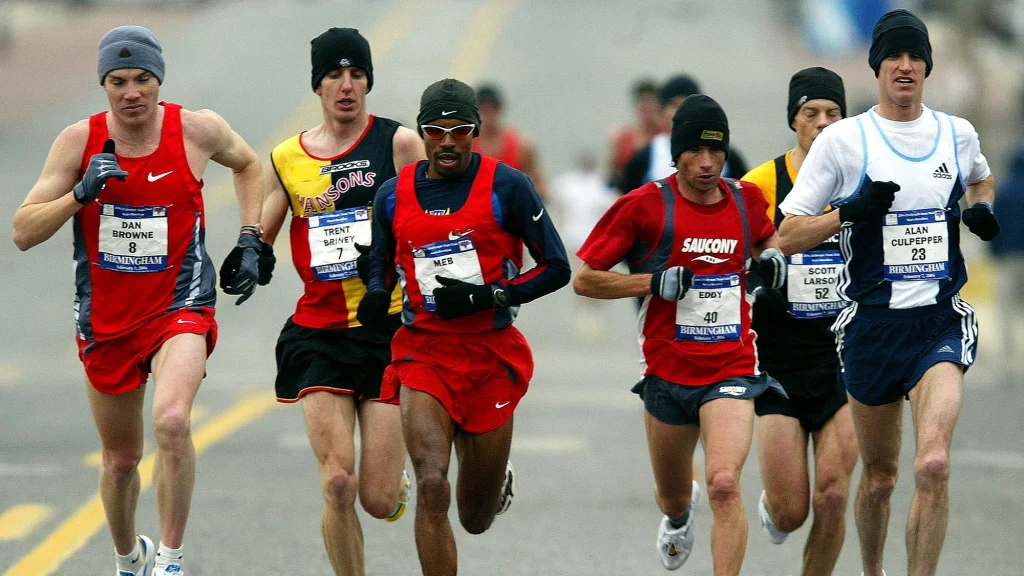How To Start Running For Marathon?
Are you ready to take on the challenge of running a marathon? Starting a marathon training program can be both exciting and daunting, but with the right approach, you can achieve your goal. Whether you’re a beginner or an experienced runner looking to tackle the 26.2-mile distance, this guide will provide you with valuable tips and advice on how to start running for a marathon.
Beginning marathoners should aim to build their weekly mileage up to 50 miles over the four months leading up to race day. Three to five runs per week are sufficient. The vast majority of these runs should be done at a relaxed pace. You should run at an easy enough pace to be able to carry on a conversation.
From setting realistic goals to gradually increasing your mileage, incorporating cross-training, and maintaining a proper nutrition plan, this introduction will lay the foundation for your marathon journey. Lace up your running shoes, and let’s dive into the world of marathon training!
How to Train for a Marathon?
Training for a marathon requires a structured approach to gradually build endurance and prepare your body for the 26.2-mile distance. Here are some key steps to follow:
Consisteny patience, and listening to your body are key to a successful marathon training journey.
What Is Marathon?
A marathon is a long-distance running race with a standardized distance of 26.2 miles or 42.195 kilometers. It is typically held as a road race, although it can also take place on trails or tracks. Marathons are considered one of the ultimate tests of endurance and are popular events that attract participants from all over the world.
The race requires physical fitness, mental strength, and strategic pacing to complete the challenging distance within a specified time limit. Marathons are often seen as a personal achievement and a symbol of determination and perseverance.
How to Run a Marathon for Beginners?

Running a marathon as a beginner may seem like a daunting task, but with the right approach, it’s achievable. Here are some tips to help you prepare:
Build a base
Start by gradually increasing your running distance and building a solid foundation of endurance. Begin with shorter runs and gradually increase your mileage over time.
Follow a training plan
Find a beginner-friendly marathon training plan that suits your schedule and fitness level. It should include a mix of running, cross-training, and rest days to prevent overtraining and reduce the risk of injury.
Pace yourself
During training runs and the actual marathon, pace yourself conservatively. Start at a comfortable pace and gradually increase if you feel strong. Avoid starting too fast, as it can lead to exhaustion later on.
Fuel and hydrate properly
Learn about proper nutrition and hydration for endurance running. Fuel your body with a balanced diet, consume carbohydrates before long runs, and hydrate adequately during training and on race day.
Listen to your body
Pay attention to any signs of fatigue, pain, or injury. Rest when needed and don’t push through excessive discomfort. Seek advice from a healthcare professional if you experience persistent issues.
Join a running group or find a buddy
Training with others can provide motivation, support, and accountability. Consider joining a local running group or finding a training partner to share the journey with.
Stay consistent and be patient
Consistency is key in marathon training. Stick to your training plan, but also be flexible and adjust as needed. Remember that progress takes time, so be patient with yourself and trust the process.
Enjoy the experience
Running a marathon is a significant accomplishment. Embrace the journey, celebrate small victories along the way, and enjoy the experience of crossing the finish line on race day.
How long does it take to train for a marathon?
The duration of marathon training can vary depending on factors such as your current fitness level, running experience, and the specific training plan you choose. However, a common recommendation is to allow yourself at least 16-20 weeks of dedicated training to prepare for a marathon.
During this training period, you will gradually increase your mileage, incorporate long runs, speed workouts, and cross-training, and give your body time to adapt and build endurance. This timeframe allows for a progressive and structured approach to avoid overtraining and reduce the risk of injury.
Keep in mind that individual circumstances may differ, and some runners may require more or less time to adequately prepare for a marathon. It’s important to listen to your body, consult with a coach or experienced runners, and adjust your training plan as needed to ensure a safe and effective preparation for the marathon distance.
Related To: Best Running Shoes For Knee Pain
Related To: Best Running Shoes For Supination
What pace should I be running at?
The pace at which you should be running during marathon training depends on various factors, including your current fitness level, running experience, and your specific goals for the marathon. Here are a few guidelines to consider:
Easy Runs
The majority of your training runs should be done at an easy, conversational pace. This pace allows you to maintain a comfortable effort level and build aerobic endurance without excessive fatigue. You should be able to hold a conversation while running at this pace.
Long Runs
Long runs should be done at a slightly slower pace than your easy runs. The focus here is on building endurance, so it’s important to prioritize distance over speed. Aim for a pace that allows you to complete the desired mileage without feeling overly fatigued.
Speed Workouts
Speed workouts, such as intervals or tempo runs, involve running at a faster pace to improve your speed and running economy. The pace for these workouts will vary depending on the specific workout and your current fitness level. Consult a training plan or coach for guidance on appropriate speed workout paces.
Race Pace Runs
As you get closer to your marathon, it’s beneficial to incorporate race pace runs. These runs involve running at your goal marathon pace to practice pacing and familiarize yourself with the effort required on race day.
What should I do if I miss some of my marathon training plan?
If you miss some of your marathon training plan, it’s important to stay flexible and make adjustments. Don’t try to cram missed workouts into your schedule, as this can increase the risk of injury or burnout. Instead, focus on the upcoming workouts and prioritize consistency moving forward. If you missed a long run or key workout, consider modifying your training plan to gradually catch up or seek guidance from a coach to help you adjust your schedule accordingly.
I’m finding the training hard, how do I know when I need to back off?
Knowing when to back off during marathon training is crucial to prevent overtraining and injury. Signs that you may need to back off include persistent fatigue, decreased performance, excessive muscle soreness, prolonged recovery, and a decline in motivation. Listen to your body, prioritize rest and recovery, and consider consulting a coach or healthcare professional for guidance.
Related To: Best Running Shoes For Morton’s Neuroma
Related To: Best Running Shoes For Shin Splints
I’ve got a last-minute charity marathon place, what should I do?
If you have a last-minute charity marathon place, it’s important to approach your training with caution. Assess your current fitness level and adjust your expectations accordingly. Focus on building endurance through long runs and gradually increasing mileage. Seek guidance from experienced runners or coaches to create a condensed training plan that balances training and recovery. Prioritize injury prevention and listen to your body throughout the process.
What about strength training for a marathon?
Strength training is a valuable component of marathon training. It helps improve running economy, prevents injuries, and enhances overall performance. Incorporate exercises that target the muscles used in running, such as the core, glutes, hips, and legs. Focus on exercises like squats, lunges, deadlifts, planks, and hip bridges.
Aim for two to three strength training sessions per week, allowing for proper recovery. Consult with a trainer or coach to develop a strength training plan that complements your marathon training and addresses your specific needs.
What shoes should I buy for the marathon?
Choosing the right shoes for a marathon is crucial. Look for running shoes that provide proper support, cushioning, and a comfortable fit. Consider factors such as your foot type, running style, and any specific needs or preferences. It’s recommended to visit a specialty running store for a professional fitting and guidance in selecting the right shoes for your marathon training and race.

The Four Building Blocks of Marathon Training
The four building blocks of marathon training are essential components that form the foundation of a successful training program. These building blocks are:
Endurance
Building endurance is crucial for completing the marathon distance. This involves gradually increasing your weekly mileage and incorporating long runs to train your body to handle the sustained effort required for 26.2 miles.
Speed and Tempo
Speed workouts, such as intervals and fartleks, help improve your running pace and increase your overall speed. Tempo runs, which involve running at a comfortably hard pace, enhance your lactate threshold and teach your body to sustain a faster pace for longer periods.
Strength Training
Incorporating strength training exercises into your routine helps prevent injuries, improves running economy, and enhances overall performance. Focus on exercises that target the muscles used in running, such as the core, glutes, hips, and legs.
Rest and Recovery
Adequate rest and recovery are essential for allowing your body to adapt and grow stronger. Rest days and easy runs should be included in your training plan to prevent overtraining and reduce the risk of injury. Additionally, prioritize sleep, proper nutrition, and active recovery techniques like stretching and foam rolling.
Related To: Best Running Shoes For Achilles Tendonitis
Related To: Best Running Shoes For Treadmill
Conclusion
Embarking on the journey of training for a marathon requires dedication, perseverance, and a well-thought-out plan. By following the steps outlined in this guide, you can set yourself up for success. Remember to start slowly, gradually increase your mileage, listen to your body, and incorporate cross-training and proper nutrition into your routine. With consistent effort and a positive mindset, you’ll be well on your way to crossing that finish line and achieving your marathon goals. Good luck on your running journey!












